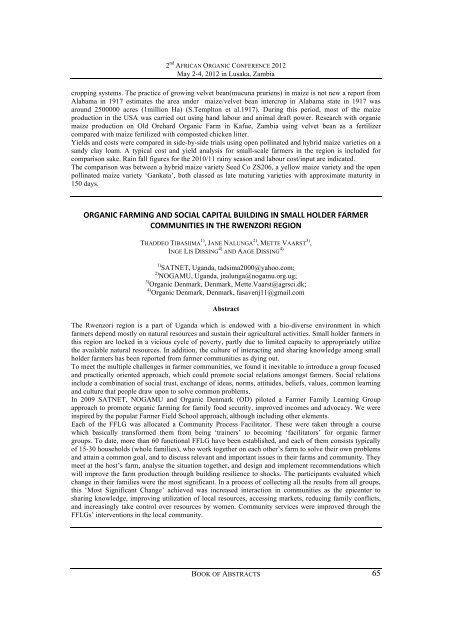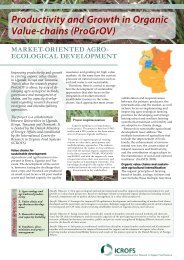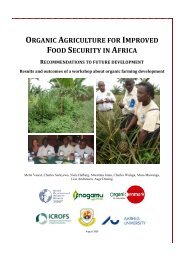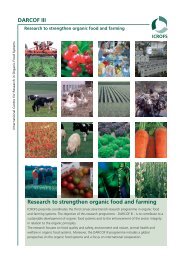The 2nd African Organic Conference â Mainstreaming ... - ICROFS
The 2nd African Organic Conference â Mainstreaming ... - ICROFS
The 2nd African Organic Conference â Mainstreaming ... - ICROFS
You also want an ePaper? Increase the reach of your titles
YUMPU automatically turns print PDFs into web optimized ePapers that Google loves.
2 nd AFRICAN ORGANIC CONFERENCE 2012<br />
May 2-4, 2012 in Lusaka, Zambia<br />
cropping systems. <strong>The</strong> practice of growing velvet bean(mucuna pruriens) in maize is not new a report from<br />
Alabama in 1917 estimates the area under maize/velvet bean intercrop in Alabama state in 1917 was<br />
around 2500000 acres (1million Ha) (S.Templton et al.1917). During this period, most of the maize<br />
production in the USA was carried out using hand labour and animal draft power. Research with organic<br />
maize production on Old Orchard <strong>Organic</strong> Farm in Kafue, Zambia using velvet bean as a fertilizer<br />
compared with maize fertilized with composted chicken litter.<br />
Yields and costs were compared in side-by-side trials using open pollinated and hybrid maize varieties on a<br />
sandy clay loam. A typical cost and yield analysis for small-scale farmers in the region is included for<br />
comparison sake. Rain fall figures for the 2010/11 rainy season and labour cost/input are indicated.<br />
<strong>The</strong> comparison was between a hybrid maize variety Seed Co ZS206, a yellow maize variety and the open<br />
pollinated maize variety ‘Gankata’, both classed as late maturing varieties with approximate maturity in<br />
150 days.<br />
ORGANIC&FARMING&AND&SOCIAL&CAPITAL&BUILDING&IN&SMALL&HOLDER&FARMER&<br />
COMMUNITIES&IN&THE&RWENZORI®ION&<br />
THADDEO TIBASIIMA 1) , JANE NALUNGA 2) , METTE VAARST 3) ,<br />
INGE LIS DISSING 4) AND AAGE DISSING 4)<br />
1) SATNET, Uganda, tadsima2000@yahoo.com;<br />
2) NOGAMU, Uganda, jnalunga@nogamu.org.ug;<br />
3) <strong>Organic</strong> Denmark, Denmark, Mette.Vaarst@agrsci.dk;<br />
4) <strong>Organic</strong> Denmark, Denmark, fasavenj11@gmail.com<br />
Abstract<br />
<strong>The</strong> Rwenzori region is a part of Uganda which is endowed with a bio-diverse environment in which<br />
farmers depend mostly on natural resources and sustain their agricultural activities. Small holder farmers in<br />
this region are locked in a vicious cycle of poverty, partly due to limited capacity to appropriately utilize<br />
the available natural resources. In addition, the culture of interacting and sharing knowledge among small<br />
holder farmers has been reported from farmer communities as dying out.<br />
To meet the multiple challenges in farmer communities, we found it inevitable to introduce a group focused<br />
and practically oriented approach, which could promote social relations amongst farmers. Social relations<br />
include a combination of social trust, exchange of ideas, norms, attitudes, beliefs, values, common learning<br />
and culture that people draw upon to solve common problems.<br />
In 2009 SATNET, NOGAMU and <strong>Organic</strong> Denmark (OD) piloted a Farmer Family Learning Group<br />
approach to promote organic farming for family food security, improved incomes and advocacy. We were<br />
inspired by the popular Farmer Field School approach, although including other elements.<br />
Each of the FFLG was allocated a Community Process Facilitator. <strong>The</strong>se were taken through a course<br />
which basically transformed them from being ‘trainers’ to becoming ‘facilitators’ for organic farmer<br />
groups. To date, more than 60 functional FFLG have been established, and each of them consists typically<br />
of 15-30 households (whole families), who work together on each other’s farm to solve their own problems<br />
and attain a common goal, and to discuss relevant and important issues in their farms and community. <strong>The</strong>y<br />
meet at the host’s farm, analyse the situation together, and design and implement recommendations which<br />
will improve the farm production through building resilience to shocks. <strong>The</strong> participants evaluated which<br />
change in their families were the most significant. In a process of collecting all the results from all groups,<br />
this ‘Most Significant Change’ achieved was increased interaction in communities as the epicenter to<br />
sharing knowledge, improving utilization of local resources, accessing markets, reducing family conflicts,<br />
and increasingly take control over resources by women. Community services were improved through the<br />
FFLGs’ interventions in the local community.<br />
BOOK OF ABSTRACTS 65





